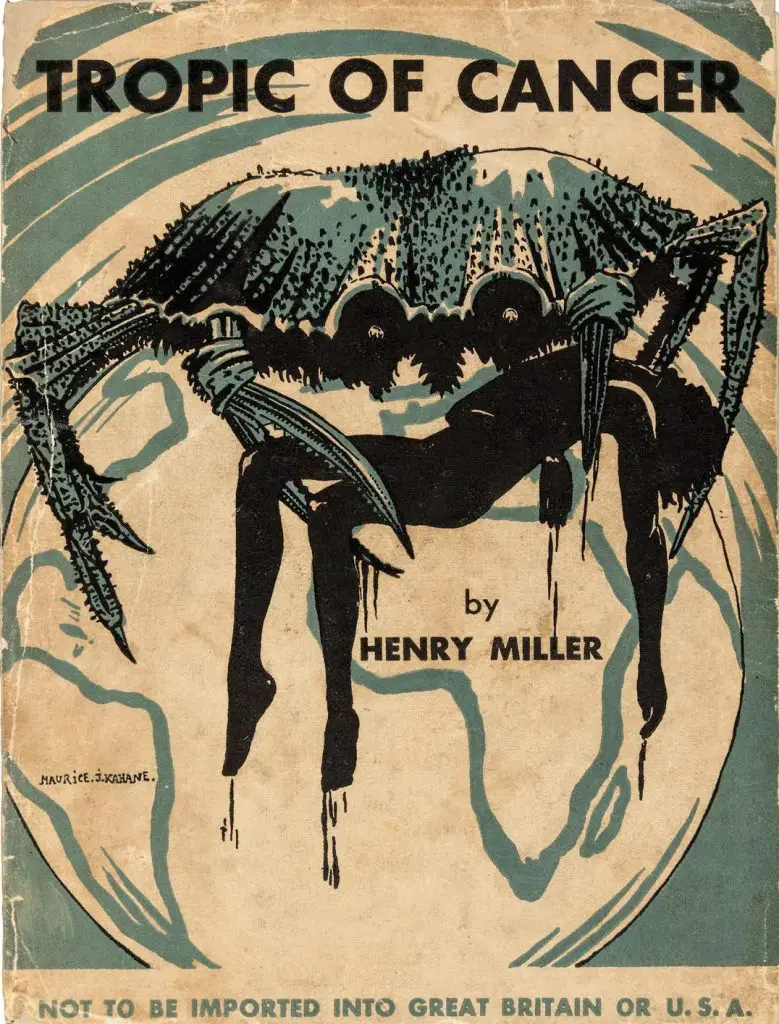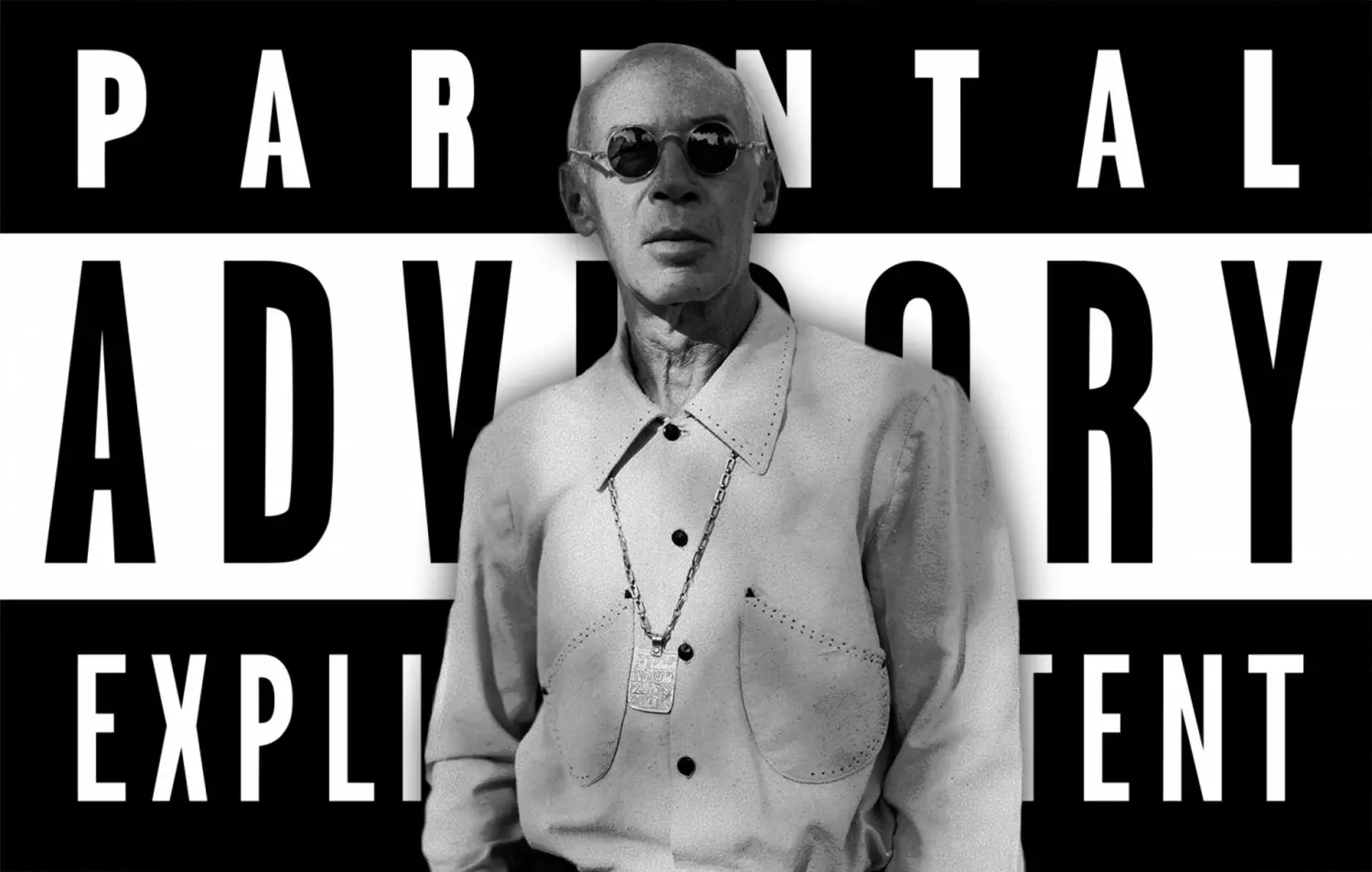When Henry Miller’s Tropic of Cancer was proffered by French publisher Obelisk in 1934, the book was immediately banned in the United States, the United Kingdom, and Canada due to the prurient nature of its content. In case you’re unfamiliar with the meaning of the word “prurient,” a rough definition of it could be “of or having to do with f#cking,” and ToC is full of it.
Of course the French didn’t have any problem with it, with them being notoriously more accepting of humankind’s more carnal inclinations, but back then Miller’s explicit depictions of sex proved to be too much for the prudish, more conservative societies of England and America. It took a Supreme Court ruling in 1964 before the book could be published and distributed legally on the U.S. side of the pond.
Of course the French didn’t have any problem with it, with them being notoriously more accepting of humankind’s more carnal inclinations…
It’s worth noting that Tropic of Cancer was banned just as Hitler and his nightmare goons were burning books en masse. Books—Hitler understood—have a terrible way of causing people to think, and any system of control worth its jackboots knows that anything that makes people think must be censored. This is the very nature of censorship, to which liberal democracies have consistently championed themselves as ardent opponents.

Tropic of Cancer finally overcame the censors during the liberal explosion of the 1960’s, not only because it fit neatly into the hippies’ sexual revolution, but because the open-minded reader saw much more than the salacious—they realized that the book was a call to action for the spirit.
“Everyone says sex is obscene. The only true obscenity is war.”
“I used to think a bird couldn’t fly if its wings got wet.”
“Today I am proud to say that I am inhuman, that I belong not to men and governments, that I have nothing to do with creeds and principles. I have nothing to do with the creaking machinery of humanity—I belong to the earth!”
It’s easy to see how liberal, progressive-minded people then and now would abhor the censorship of statements such as these. But how would the liberal of today handle something like this?
“A young cunt is an investment; an old cunt is a dead loss.”
In our current state of hypervigilant political correctness, it isn’t difficult to imagine how this could kick up something of a fuss. I would go so far as to say, in fact, that while liberals and progressives once promoted Henry Miller as a victim of censorship, they would today decry him as obscene.
Parental Discretion is Advised
Before we continue, it’s worth mentioning that the writer of this piece falls firmly in the far-left of the political spectrum. But while I’m well-aware of the arguments for and the importance of the progressive discussion surrounding language—particularly language that echoes in the realm of hate speech—I also see why many are becoming concerned about the over-policing of speech by the left.
This trend began in the late-1980s when Tipper Gore—wife of future Vice President Al Gore—got all up in a fluster when she heard her daughter listening to Prince’s “Darling Nikki,” the lyrics of which prompted her to launch an anti-obscenity crusade that led to the creation of the Parents Music Resource Center, the efforts of which ultimately resulted in the establishment of the Parental Advisory sticker. In addition to Prince, the PMRC specifically targeted such heinous and diverse artists as Madonna, NWA, Ice-T, 2 Live Crew, Black Sabbath, Mötley Crüe, Def Leppard, Twisted Sister, and Cyndi Lauper. Apparently Tipper did not think girls should wanna have fun.
Anyways, this all caused such an uproar that the whole thing was brought before congress, where the likes of Dee Snyder, Jello Biafra, Joey Ramone, Frank Zappa, and John Denver testified against the Parental Advisory label, calling it censorship. That’s right—“Country Roads” and “Thank God I’m a Country Boy” John Denver went up to bat for Ice Cube’s right to say “Fuck the Police.”
In the end Tipper and the PMRC won, Parental Advisory stickers and age restrictions swept through the industry, and that’s why I wasn’t allowed to purchase Rage Against the Machine’s Evil Empire and Green Day’s Dookie, and had to ask my mom to do it for me. Back when Sam Goodie was a thing.
Oh, the ’90s.
…Prince’s “Darling Nikki,” the lyrics of which prompted her to launch an anti-obscenity crusade that led to the creation of the Parents Music Resource Center…
Morality Moves Left
Tipper and the “Washington Wives” of the PMRC (that’s what they called themselves—a moniker that rang eerily close to the “Stepford Wives”) represented a fairly moderate brand of liberalism, but as the decades progressed, the mantle of morality monitoring moved gradually to the progressives.
Today the left half of the political sphere is becoming overrun by handwringers. Democratic candidates for president keep talking about returning “morality” to the White House, which sounds dangerously close to the Moral Majority talk of Jerry Falwell and Ronald Reagan. And on the further edges of the spectrum, progressives are so busy trying to bite each other’s tongues off and out-progressive one another that everyone else has begun to hear them as—at best—incomprehensible or—at worst—word and thought police.
…as the decades progressed, the mantle of morality monitoring moved gradually to the progressives.
I must mention once more that I sympathize with and advocate efforts to modernize language, especially in relation to how we refer to one another. It is a very good thing that it is no longer acceptable to use the slurs with which we are all-too-familiar to describe people who are gay, black, female, disabled, or whatnot. Words have power, and it is a power we are still learning to use wisely and justly.
At the same time, when I read the rollicking, lubricious language of Henry Miller’s Black Spring for example…
“For me the book is the man and my book is the man I am, the confused man, the negligent man, the reckless man, the lusty, obscene, boisterous, thoughtful, scrupulous, lying, diabolically truthful man that I am.”
…I find myself thinking that we are all confused and negligent and reckless and obscene—because we are human. And humans should not be linguistic prisoners any more than they should be physical captives. Our language needs to run free, even if it does fall down and scrape its knees now and again.
Who gets to choose what is or is not “moral”? And who defines “obscene”? Let obscenity be the mother tongue of the radical—the puritans can keep their morality.

Anaïs Nin—a colleague, friend, and lover of Henry Miller’s—once wrote, “The important task of literature is to free man, not to censor him, and that is why Puritanism was the most destructive and evil force which ever oppressed people and their literature: it created hypocrisy, perversion, fears, sterility.”
The important task of literature is to free man, not to censor him
– Anaïs Nin
There is nothing progressive about lumbering toward some mirage of linguistic purity. There is nothing liberal about censorship. And the more the left tries to establish limitations upon what we can and can’t say, the more people will try to break free of their dwindling dictionary.
Or as Henry Miller put it, “Whatever needs to be maintained through force is doomed.”





